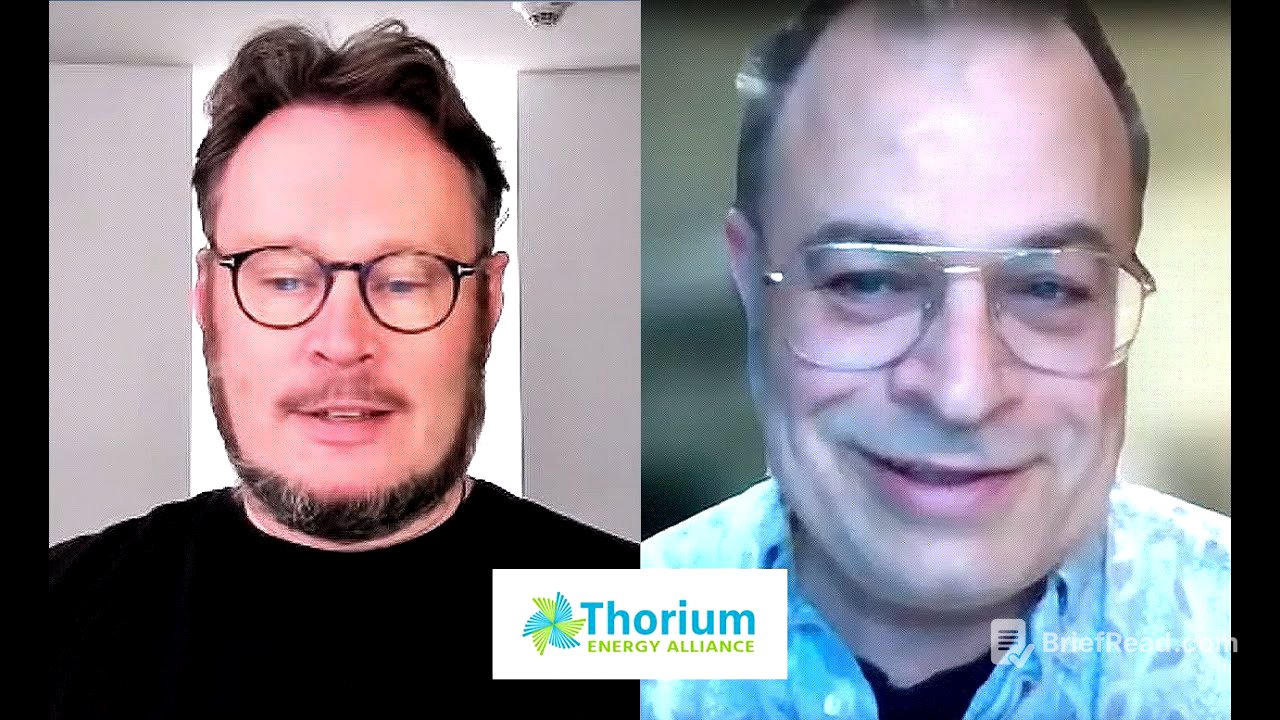TLDR;
This podcast discusses the potential of thorium as a superior nuclear fuel compared to uranium, highlighting its abundance, cost-effectiveness, and safety advantages. It also covers the economic and national security implications of thorium energy, the role of private investment in nuclear energy, and the potential for thorium to power data centers and various industrial applications. The conversation emphasizes the need for simpler, safer reactor designs and the importance of energy abundance for global prosperity and solving social problems.
- Thorium is far more abundant and cost-effective than uranium.
- Thorium reactors can be smaller and safer than traditional reactors.
- Energy abundance is crucial for economic growth, solving social problems, and improving quality of life globally.
Introduction to Thorium Energy and Recent Developments [0:00]
The podcast begins with an introduction to the discussion about the future of thorium energy and its potential impact over the next decade. Recent developments include increased funding and a shift in attitude towards thorium by agencies like ARPA and DARPA in the United States. Thorium is now being considered a viable fuel source, a significant change from its previous status as a secondary option. The Thorium Energy Alliance is also establishing the Thorium Products Corporation to handle and sell thorium for various applications, including fuel.
Comparison of Uranium and Thorium as Nuclear Fuels [3:03]
The discussion shifts to comparing uranium and thorium as nuclear fuels. Uranium-235, used in most current reactors, requires enrichment and results in spent fuel that is not fully utilized. Enriched uranium is expensive, costing around $18,000 per kilogram for 19.8% enrichment. In contrast, thorium is much cheaper at about $50 per kilogram and does not require enrichment. Thorium is a fertile fuel, meaning it needs a breeder reactor to be effective, but it is significantly more abundant, with 2,000 times more usable thorium on Earth than uranium.
Advantages of Thorium Reactors and Molten Salt Reactors [9:43]
Thorium reactors, particularly molten salt reactors, offer several advantages. They can be smaller and operate at lower pressures, reducing construction costs by 10 to 100 times compared to lightwater reactors. Thorium is the only fertile fuel that can create a breeder reactor in a thermal spectrum, which is essential for realizing its benefits. While uranium-238 can be used in fast spectrum reactors, these have historically been difficult to operate successfully. Thermal cycle reactors using thorium offer inherent stability and lower risk.
Economic Viability and Deployment of Copenhagen Atomics Reactors [12:31]
The discussion highlights the economic focus of Copenhagen Atomics, aiming to produce electricity and thermal energy at competitive prices. The company has built two full-scale test reactors and is working on a third that could potentially start a chain reaction. The reactors are constructed using readily available components from the steel industry, costing approximately $6 million per reactor without fuel. This is significantly less than traditional nuclear reactors like Hinkley Point C, which has an "idiot index" of 10, meaning it costs ten times more than the raw materials required.
Licensing and Scalability of Thorium Reactors [17:56]
Licensing is a critical factor in the deployment of nuclear reactors. Once a system like Copenhagen Atomics' reactor is approved by the NRC, it can be replicated multiple times without each unit requiring individual approval. The design of these reactors ensures that even in the event of a failure, the impact is contained, and multiple units are unlikely to fail simultaneously. This modular approach allows for incremental deployment, making it more economically feasible for developing countries and industries.
Industrial Applications and Data Centers [21:31]
Nuclear energy, particularly from thorium reactors, can be used in various industrial applications such as hydrogen, ammonia, steel, and aluminum production. These applications represent a larger market than the global electricity market. The discussion also touches on the potential for nuclear energy to power data centers, referencing Elon Musk's vision of a one-terawatt data center. The speakers suggest that artificial intelligence could optimize data center power consumption, but the primary focus should be on using nuclear energy for essential industries like ammonia and synthetic petroleum production.
The Promise of Synthetic Products and Energy Abundance [25:53]
The conversation shifts to the broader implications of energy abundance, particularly in the context of synthetic products. Synthetic materials, such as diamonds, blood, meat, and oil, often surpass their natural counterparts in quality and cost. Nuclear power can be used to create these synthetic products more efficiently and sustainably. Energy abundance is essential for improving living standards globally, providing opportunities for economic growth and prosperity, and addressing social issues.
Future Energy Needs and the Role of Thorium [32:43]
The discussion addresses future energy needs, projecting a potential 10 to 30-fold increase in energy demand over the next century due to data centers, AI, and overall global development. While wind and solar energy can contribute, thorium energy is expected to play a significant role, potentially providing half of all energy by 2100. The key to thorium's success is its price competitiveness, which will drive its adoption and widespread deployment.
Simplicity, Safety, and Additional Uses of Thorium [39:45]
The speakers emphasize the importance of simplicity and inherent safety in reactor designs, drawing inspiration from Alvin Weinberg's vision of "a pot, a pipe, and a pump." Molten salt reactors and other Gen 4 reactors are designed to shut themselves down in the event of a problem, reducing the need for complex redundant systems. Beyond fuel, thorium has numerous industrial uses, such as enhancing the conductivity of aluminum and copper, improving optics, and creating high-temperature ceramics.
The Thorium Century and Global Impact [43:37]
The speakers envision the current century as the "Thorium Century," where thorium will play a central role in energy production and materials science. Energy abundance will enable manufacturing to become hyper-localized, fostering economic development in various countries. Providing affordable energy to developing nations can transform them from potential pariahs into valuable assets, promoting stability and prosperity.
Energy as the Foundation of a Prosperous Society [48:21]
Energy is identified as the fundamental building block of a prosperous society, essential for civil rights, legal systems, water, medicine, and transportation. Taxing energy is seen as counterproductive, hindering the development of a great society. The speakers advocate for making nuclear power cheaper than coal, which would drive its adoption globally and enable countries to lift their people out of poverty.
The Path Forward and the Promise of Thorium Energy [53:15]
The podcast concludes with a call to action, urging the development and deployment of thorium energy to create a world of opportunity and abundance. The speakers express optimism that the US will be a first mover in adopting thorium energy, leading to a doubling of electricity production in the next 10 to 15 years. Overcoming regulatory hurdles and embracing simpler, safer reactor designs are key to realizing the full potential of thorium energy.









